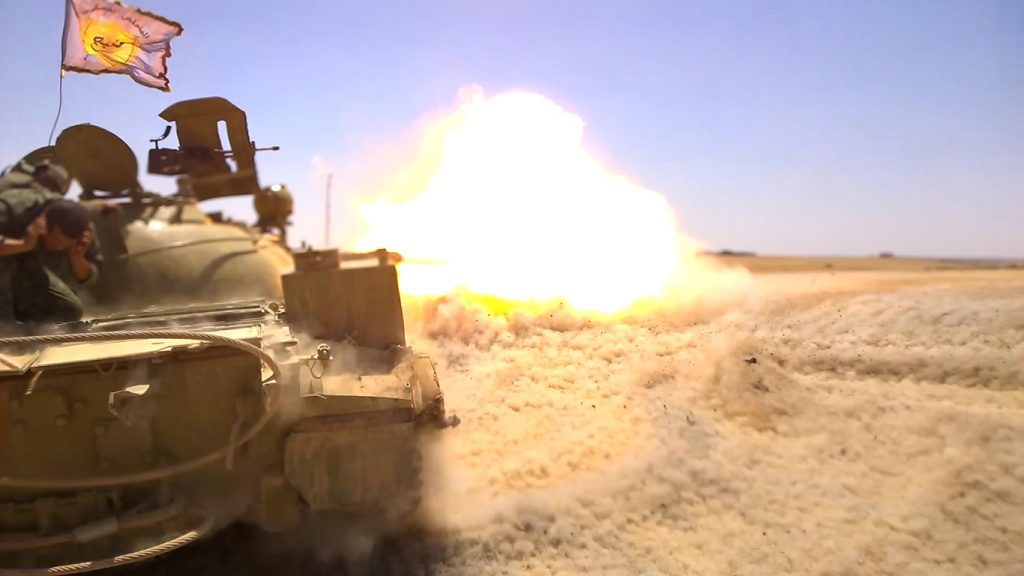By Ed Nash
22 October 2018

Donald Trump recently praised what he described as the sacrifice of Kurds in the fight against ISIS across Iraq and Syria to the international press. His declaration was made shortly after the State Department removed the previous rather limited reference to the Syrian Kurdish militias known as the Yekîneyên Parastina Gel (Peoples Protection Units - YPG) from its ‘Country Reports on Terrorism 2017’. As a consequence, President Erdogan of Turkey accused the US of breaking its word in agreements reached between the two countries whereby the YPG were to withdraw from the town of Manbij in northern Syria.
A dangerously volatile nexus — composed of a range of disparate groups including the YPG — now exists in Manbij. These disparate groups operate in the same space as Turkish troops, who seek to advance their own, opposing agenda in the region.
If we read into America’s intention[1] to take a more steadfast position on backing the Syrian Kurds, then the US is very much antagonising a long time NATO ally and critical regional partner with whom relations are already at an unparalleled low.
The reasons for these tensions are multiple, and thus can hardly be summarised in a few sentences. The focus of this piece is elsewhere. Indeed, it is perhaps wise to understand a bit more about the YPG, what they stand for and why the Turks are so concerned about them, as they form such a thorny part of the disagreement.
The YPG and Yekîneyên Parastina Jin (Women’s Protection Units - YPJ) are predominantly Kurdish militias which represent the armed wing of the PYD (Partiya Yekîtiya Demokrat or Democratic Union Party). The latter organisation subscribes to the ideological, philosophical and historical writings of Abdullah Öcalan, a Kurdish political theorist and guerrilla leader who originally founded the infamous PKK, who have fought a bitter war against the Turkish military on and off for almost forty years.
This connection arguably explains the Turks’ antipathy. For them, the PYD/YPG are simply the same as the PKK and thus represent an intolerable threat to their security (for an interesting refutation of this, see Hurriyet Daily News and Foreign Policy). As the SDF - which the YPG forms the major component of – controls the whole of the north-east of Syria as the Democratic Federation of Northern Syria (generally known as Rojava), the Turk’s concerns are understandable.
Öcalan originally founded the PKK as a Soviet/Stalinist style communist party seeking a socialist Kurdish state but, inspired by the writings of American social theorist Murray Bookchin, has since become focused upon promoting Democratic Confederalism, a political theory that mixes Marxism-Leninism, Stalinism, anarchism, and libertarian ideals. Broadly, it espouses the idea that the authority of a central government should be kept to a minimum, that power should be highly decentralised, and local issues should be addressed at a local level; that regional, racial, and religious customs should be respected; and greater attention is need to espouse gender equality and ecological issues. The theory also advocates for a fairer redistribution of wealth along similar lines to European social democracy.
Such a mix of political theories would seem to create a rather schizophrenic ideology that, depending on your personal stance, could be interpreted in any way one deems fit. And there are definite, radical contrasts in how the PYD/YPG conducts itself that demonstrate this. On the one hand, areas under their control have brought women’s rights into fact. On the other hand, however, they have been accused of recruiting child soldiers and criticised for their human rights record, as well as persecution of other political parties in the region.
It is in their reaction to these external criticisms that we see the key to the world’s relationship with the PYD/YPG. Complaints against them by external actors are generally addressed and openly rectified, which stands in stark contrast to just about every other faction involved in the Syrian Civil War, the Assad government included.
What motivates this willingness is the wish to be seen to be a better, more democratic society that can engage with the international community, something the council currently running northern Syria understands it needs desperately. Without a powerful backer, the fledgling experiment in local democracy will be mercilessly crushed by either Assad or the Turks, as what took place with the Kurdish canton of Afrin.
And it seems that the sudden interest in America for sponsoring the YPG beyond the defeat of ISIS could be inspired by the realisation that, if it won’t commit to backing the Kurds and their assorted allies in Syria, then others will. Recently the YPG has made overtures to Assad and the Iranians, seeking their support. With , the sudden renewed interest in the Kurds as a local ally makes sense.
There is no denying that continued support for the YPG/PYD is beset with political complexities, including a number of concerns with the movement’s ideology, that will need to be addressed if it is to continue to receive said support. At this time, however, it is probably the best chance for more reasoned, democratic, and ultimately law-abiding governance in the region.
Ed Nash has spent years travelling around the world and, on occasion, interfering as he sees fit. Between June 2015 and July 2016 he volunteered with the Kurdish YPG in its battle against ISIS in Syria. His book Desert Sniper: How One Ordinary Brit Went to War Against ISIS was published in September 2018.
Notes:
[1] Which, when concerning Syria, may be best accomplished with a crystal ball.
Image Source: the picture was provided by the author



